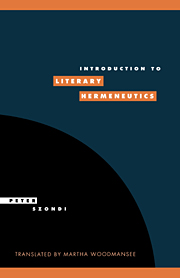Book contents
- Frontmatter
- Contents
- Foreword by Joel Weinsheimer
- Translator's preface
- Chapter 1 Introduction
- Chapter 2 Chladenius, I
- Chapter 3 Chladenius, II
- Chapter 4 Chladenius, III
- Chapter 5 Chladenius, IV
- Chapter 6 Meier, I
- Chapter 7 Meier, II
- Chapter 8 Ast
- Chapter 9 Schleiermacher, I
- Chapter 10 Schleiermacher, II
- Afterword by Jean Bollack
- Index
Chapter 5 - Chladenius, IV
Published online by Cambridge University Press: 14 December 2009
- Frontmatter
- Contents
- Foreword by Joel Weinsheimer
- Translator's preface
- Chapter 1 Introduction
- Chapter 2 Chladenius, I
- Chapter 3 Chladenius, II
- Chapter 4 Chladenius, III
- Chapter 5 Chladenius, IV
- Chapter 6 Meier, I
- Chapter 7 Meier, II
- Chapter 8 Ast
- Chapter 9 Schleiermacher, I
- Chapter 10 Schleiermacher, II
- Afterword by Jean Bollack
- Index
Summary
It is not only in the context of semantic change, which he attributes to changes in the objects words denote, that Chladenius exhibits concern with the problem of historical change and its consequences for interpretation. His theory of “point of view” [Sehe-Punckt], of the perspectival bias in understanding, takes up the problem of historicality as well. Chladenius first expounds this theory in a chapter on the interpretation of historical books and takes it up again in a chapter on the interpretation of didactic books, i.e., philosophical works. Hence his theory of point of view is closely coupled with questions concerning historical writing and also, to a lesser extent, theoretical texts, but it appears that Chladenius had a general theory of interpretation in mind. In §308 he writes:
What happens in the world is viewed by different people in different ways, such that, if many people were to give a description of an event [Geschichte], we would encounter something particular to each one, even if each had perceived the thing correctly. These differences can be explained in part by the locations and positions of our bodies, which are different for each of us; in part by the different relationships we have to the things; and in part by our previous habits of thought, by virtue of which some of us are accustomed to paying attention to this, others to that. […]
- Type
- Chapter
- Information
- Introduction to Literary Hermeneutics , pp. 53 - 66Publisher: Cambridge University PressPrint publication year: 1995

